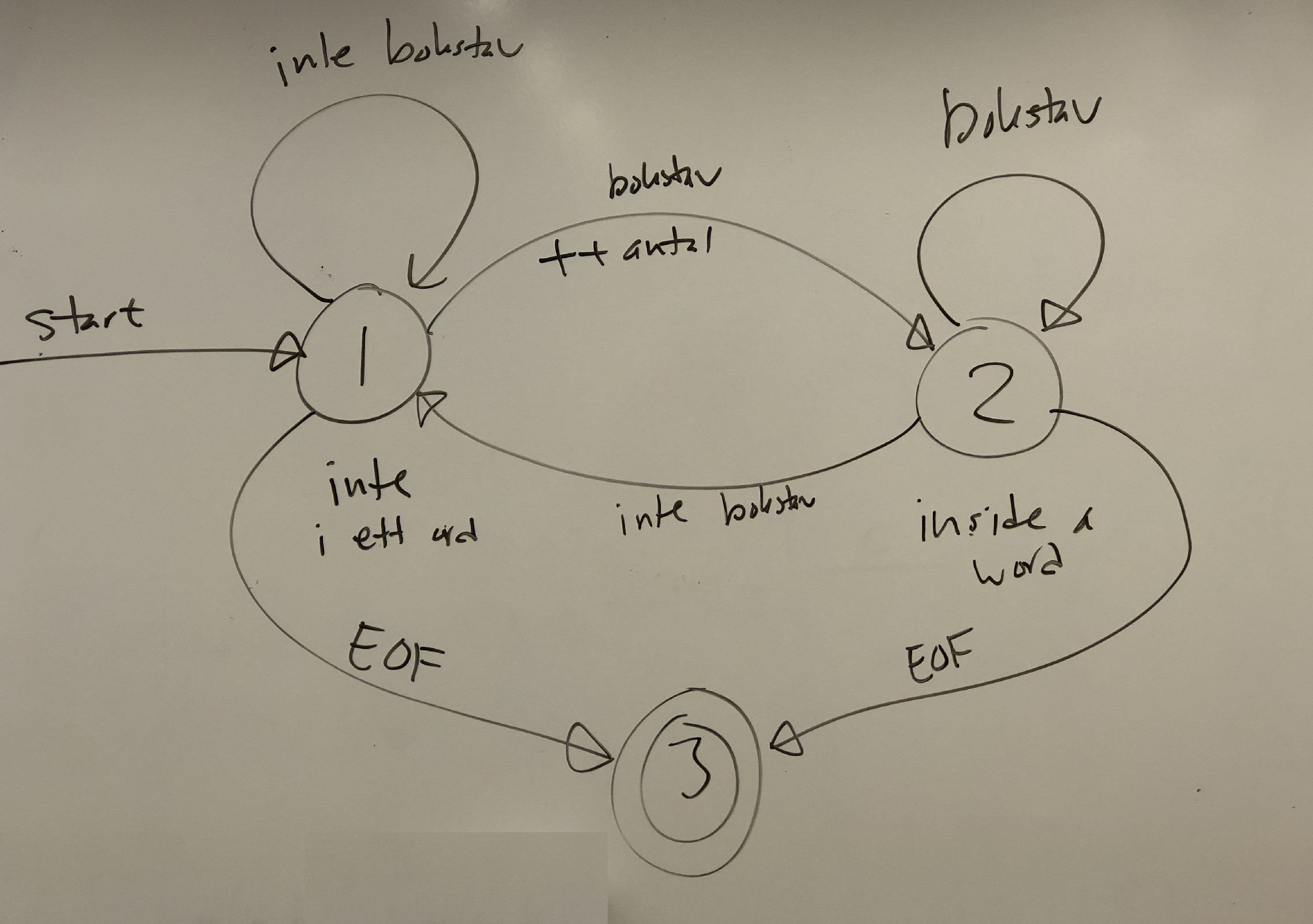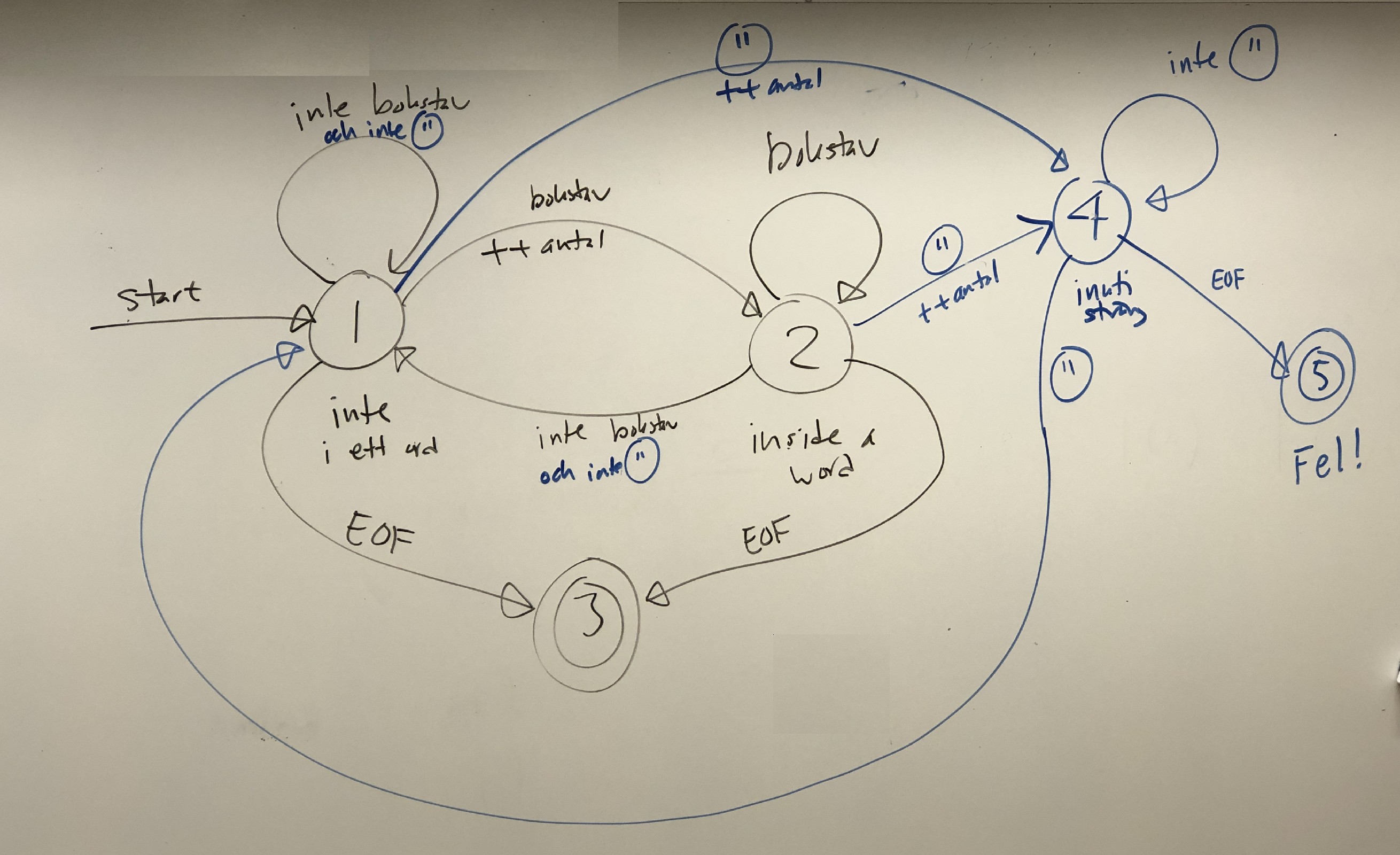Example: If I move a physical volume knob or slider, I can move it as short a distance as I want, so on the scale from minimum value to maximum I can find an infinite number of positions. (There might be limitations on our physical reality, such as the Planck length, but let's ignore that for now.) Seen as a state machine, a volume slider has infinitely many states. If we measure the postions of the slider using an 8-bit integer, we can only represent 28 = 256 different values, so if we see that as a state machine, it only has finitely many states.
b) A deterministic state machine can always determine which state to change to. A non-deterministic state machine can have several possible state transitions, and needs to "try them all in parallell" (or be rewritten as a determinstic state macine).


b) Colon, semicolon, and the keywords began, candy, round, trick, treat, went and home.
c) Download: halloween.l
%{
#include "halloween.tab.h"
%}
%%
[\n\t ] { /* Ignore whitespace */ }
"began" { return BEGAN; }
"candy" { return CANDY; }
"round" { return ROUND; }
"trick" { return TRICK; }
"treat" { return TREAT; }
"went" { return WENT; }
"home" { return HOME; }
[a-z]+ { printf("[WORD: '%s']", yytext); return WORD; }
";" { return SEMICOLON; }
":" { return COLON; }
. { fprintf(stderr, "[Ignoring invalid character: '%c']\n", *yytext); }
%%
#include <stdlib.h>
#include <stdio.h>
#include <string.h>
#include "halloween.tab.h"
// Tokens from halloween.y
// %token BEGAN CANDY ROUND SEMICOLON TRICK TREAT COLON WORD WENT HOME
#define MAX_WORD_LENGTH 100
int yylex(void) {
int c;
c = getchar();
// First, skip whitespace
while (c == ' ' || c == '\t' || c == '\n')
c = getchar();
// Is it EOF
if (c == EOF)
return EOF;
if (c == ':')
return COLON;
if (c == ';')
return SEMICOLON;
if (c >= 'a' && c <= 'z') {
// This is the start of a word or a keyword
char word[MAX_WORD_LENGTH + 1];
int length = 0;
word[length++] = c;
while ((c = getchar()) >= 'a' && c <= 'z') {
if (length >= MAX_WORD_LENGTH) {
word[length] = '\0';
fprintf(stderr, "Word too long: '%s'... (max is %d)\n", word, MAX_WORD_LENGTH);
exit(EXIT_FAILURE);
}
word[length++] = c;
}
ungetc(c, stdin);
word[length] = '\0';
if (strcmp(word, "began") == 0)
return BEGAN;
else if (strcmp(word, "candy") == 0)
return CANDY;
else if (strcmp(word, "round") == 0)
return ROUND;
else if (strcmp(word, "trick") == 0)
return TRICK;
else if (strcmp(word,"treat") == 0)
return TREAT;
else if (strcmp(word, "went") == 0)
return WENT;
else if (strcmp(word, "home") == 0)
return HOME;
else
return WORD;
}
fprintf(stderr, "Invalid input character: '%c' (%d)\n", c, c);
exit(EXIT_FAILURE);
}